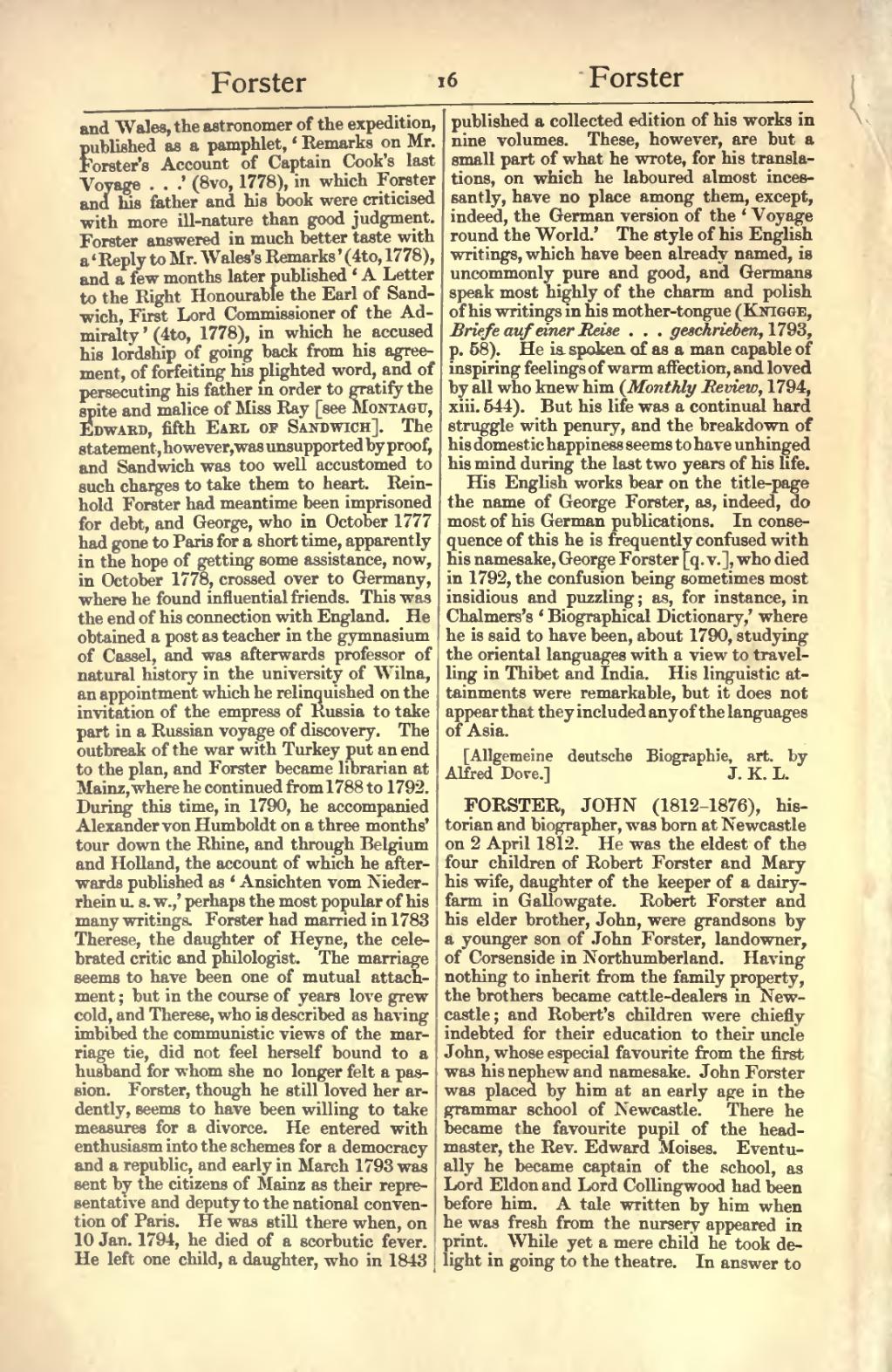and Wales, the astronomer of the expedition, published as a pamphlet, ‘Remarks on Mr. Forster's Account of Captain Cook's last Voyage …’ (8vo, 1778), in which Forster and his father and his book were criticised with more ill-nature than good judgment. Forster answered in much better taste with a ‘Reply to Mr. Wales's Remarks’ (4to, 1778), and a few months later published ‘A Letter to the Right Honourable the Earl of Sandwich, First Lord Commissioner of the Admiralty’ (4to, 1778), in which he accused his lordship of going back from his agreement, of forfeiting his plighted word, and of persecuting his father in order to gratify the spite and malice of Miss Ray [see Montagu, Edward, fifth Earl of Sandwich]. The statement, however, was unsupported by proof, and Sandwich was too well accustomed to such charges to take them to heart. Reinhold Forster had meantime been imprisoned for debt, and George, who in October 1777 had gone to Paris for a short time, apparently in the hope of getting some assistance, now, in October 1778, crossed over to Germany, where he found influential friends. This was the end of his connection with England. He obtained a post as teacher in the gymnasium of Cassel, and was afterwards professor of natural history in the university of Wilna, an appointment which he relinquished on the invitation of the empress of Russia to take part in a Russian voyage of discovery. The outbreak of the war with Turkey put an end to the plan, and Forster became librarian at Mainz, where he continued from 1788 to 1792. During this time, in 1790, he accompanied Alexander von Humboldt on a three months' tour down the Rhine, and through Belgium and Holland, the account of which he afterwards published as ‘Ansichten vom Niederrhein u. s. w.,’ perhaps the most popular of his many writings. Forster had married in 1783 Therese, the daughter of Heyne, the celebrated critic and philologist. The marriage seems to have been one of mutual attachment; but in the course of years love grew cold, and Therese, who is described as having imbibed the communistic views of the marriage tie, did not feel herself bound to a husband for whom she no longer felt a passion. Forster, though he still loved her ardently, seems to have been willing to take measures for a divorce. He entered with enthusiasm into the schemes for a democracy and a republic, and early in March 1793 was sent by the citizens of Mainz as their representative and deputy to the national convention of Paris. He was still there when, on 10 Jan. 1794, he died of a scorbutic fever. He left one child, a daughter, who in 1843 published a collected edition of his works in nine volumes. These, however, are but a small part of what he wrote, for his translations, on which he laboured almost incessantly, have no place among them, except, indeed, the German version of the ‘Voyage round the World.’ The style of his English writings, which have been already named, is uncommonly pure and good, and Germans speak most highly of the charm and polish of his writings in his mother-tongue (Knigge, Briefe auf einer Reise … geschrieben, 1793, p. 58). He is spoken of as a man capable of inspiring feelings of warm affection, and loved by all who knew him (Monthly Review, 1794, xiii. 544). But his life was a continual hard struggle with penury, and the breakdown of his domestic happiness seems to have unhinged his mind during the last two years of his life.
His English works bear on the title-page the name of George Forster, as, indeed, do most of his German publications. In consequence of this he is frequently confused with his namesake, George Forster [q. v.], who died in 1792, the confusion being sometimes most insidious and puzzling; as, for instance, in Chalmers's ‘Biographical Dictionary,’ where he is said to have been, about 1790, studying the oriental languages with a view to travelling in Thibet and India. His linguistic attainments were remarkable, but it does not appear that they included any of the languages of Asia.
[Allgemeine deutsche Biographie, art. by Alfred Dove.]
FORSTER, JOHN (1812–1876), historian and biographer, was born at Newcastle on 2 April 1812. He was the eldest of the four children of Robert Forster and Mary his wife, daughter of the keeper of a dairy-farm in Gallowgate. Robert Forster and his elder brother, John, were grandsons by a younger son of John Forster, landowner, of Corsenside in Northumberland. Having nothing to inherit from the family property, the brothers became cattle-dealers in Newcastle; and Robert's children were chiefly indebted for their education to their uncle John, whose especial favourite from the first was his nephew and namesake. John Forster was placed by him at an early age in the grammar school of Newcastle. There he became the favourite pupil of the headmaster, the Rev. Edward Moises. Eventually he became captain of the school, as Lord Eldon and Lord Collingwood had been before him. A tale written by him when he was fresh from the nursery appeared in print. While yet a mere child he took delight in going to the theatre. In answer to
